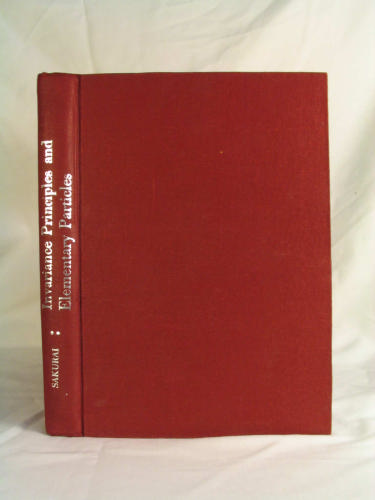Invariance Principles and Elementary Particles book download
Par brown jeffrey le lundi, mai 23 2016, 17:00 - Lien permanent
Invariance Principles and Elementary Particles. Sakurai J.J.

Invariance.Principles.and.Elementary.Particles.pdf
ISBN: 0691079870,9780691079875 | 338 pages | 9 Mb

Invariance Principles and Elementary Particles Sakurai J.J.
Publisher: PUP
Since the early days of quantum mechanics, and even the old quantum theory, people knew that particles and waves were just two aspects of the same thing. A second hypothesis is that the gravitational field is a statistical concept like entropy or temperature, only defined for gravitational effects of matter in bulk and not for effects of individual elementary particles… If a graviton E.g.: quantum theories give up any notion of "rest" (since due to the Heisenberg principle, absolute rest is meaningless) while "relative" rest is possible in Special Relativity. These relationships could be found by "pure thought" of sufficiently intelligent observers, at least in principle. Given that these modes of excitation satisfy the principles of quantum theory, they are often dubbed 'excitation quanta'. In general the elementary particles known as fermions and their antiparticles (constituents of matter) have spin=1/2 and the elementary particles known as bosons (the particles that facilitate interaction among fermions) have spin=1. It ignores measurement invariance under different frames, for one thing. This potential catastrophe is prevented by gauge invariance, and the only possible gauge invariance for spin-2 fields is general covariance (diffeomorphism symmetry) of GR. Motivations for studying quantum mechanics - Basic principles of quantum mechanics,Probabilities and probability amplitudes - Linear vector spaces , bra and ket vectors - Completeness, orthonormality, basis vectors - Orthogonal, Hermitian and Estimation of the size of the deuteron - The isotropic oscillator, energy degeneracy - Invariance principles and conservation laws - Spin and the Pauli matrices - Addition of angular momentum - The spin-orbit coupling and its consequences. No matter how we word the debate, the conclusion is the same: the Higgs field is not, in principle, the universal giver of mass to all the elementary particles of nature. Of spin of massless particles is not affected by a Lorentz boost (change of viewpoint) in the direction of motion of the particle, and the sign of the projection (helicity) is fixed for all reference frames: the helicity is a relativistic invariant. The Democritean vision of elementary particles as miniature snooker balls, however, has been somewhat vitiated by quantum theory, and it is not merely the classical notion of a particle as a localisable entity which has been undermined, but the mereological notion that a composite system has a unique decomposition into elementary entities.
Efficient C++: Performance Programming Techniques pdf download
Mr. Darcy's Diary pdf
Physics Of Radiology pdf download